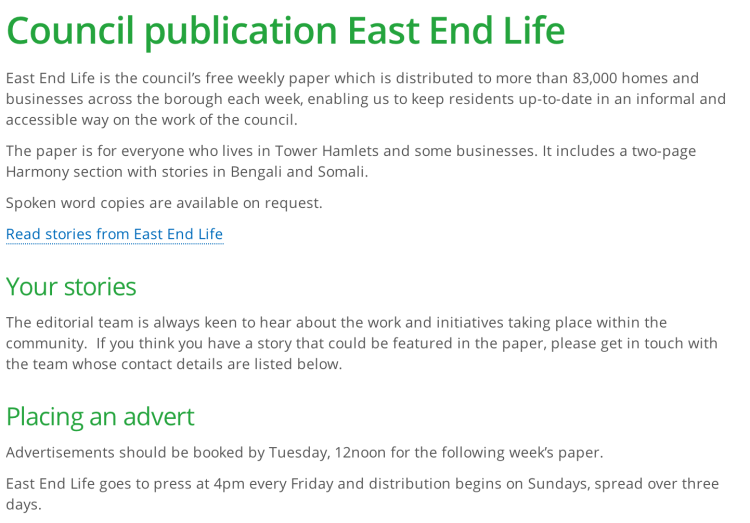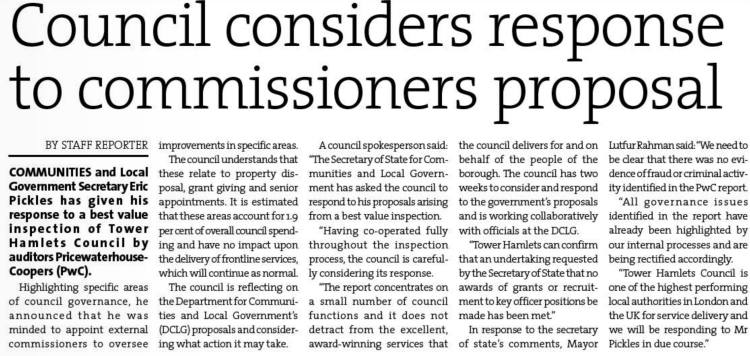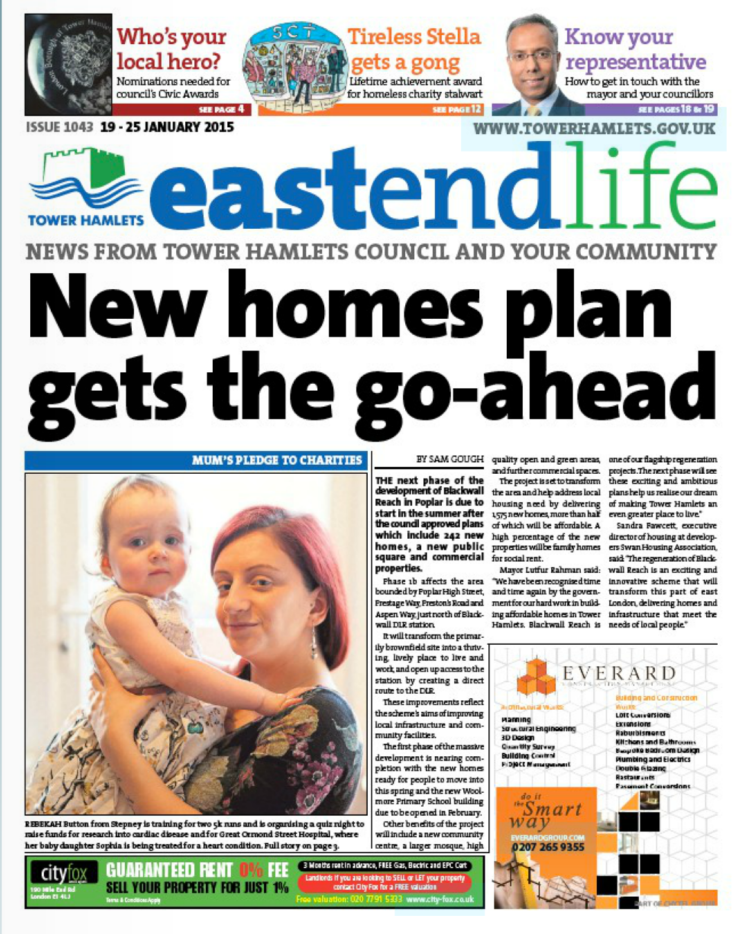Despite the best efforts of councils in various parts of the country, justifications for council-run newspapers which stand up to any scrutiny have been few and far between.
The origins of council newspapers can be tracked back to the period of time when council communications began to be less about keeping the public informed, and more about news management.
Individual communications officers shouldn’t be blamed for this, it was part of a wider culture in which, for example, it was decided the best way for councils and police to score highly in the ‘How safe do your residents feel’ performance indicator was to reduce the number of crimes which were actively reported to the press.
After five years of constant – and thoroughly right – attack and scrutiny by communities secretary Eric Pickles, very few council newspapers are published more than once a quarter. Pretty much the only justification to hold water from councils, in my opinion, is their need to communicate with an entire borough, rather than just readers of any one publication.
To that end, a quarterly update on what’s going on makes sense, although even then the scope to distort the truth remains remarkable – as anyone who lives close to a less than perfect town centre will tell you when the local council update tells you business is booming.
But a hardcore of weekly or fortnightly publications remain, largely in parts of London, still labouring under the justification that they need to produce newspapers to keep all of the public informed. Whether a council’s need to keep people informed weekly is really more to do with the sense of self-importance of those involved is perhaps another blog post entirely.
Tower Hamlets is perhaps the worst, and certainly the most prolific, offender. It underwrites its weekly East End Life with the assumption that all council advertising – and a lot of other ‘partner’ public sector advertising – will go through its newspaper. And it also takes private sector advertising, thus creating an unlevel playing field on which independent newspapers have to operate. Council newspapers can’t go bust, independent ones can.
Tower Hamlets describes the newspaper as ‘an informal way of keeping people up to date with what the council is doing.’ One of the big things Tower Hamlets is dealing with at the moment is the arrival of government commissioners to run several services. For a council, that’s pretty much the most humiliating thing which can happen.
The Guardian reported this news on November 4 – a Tuesday, three whole days before East End Life goes to press, according to its website:
Stories about local government don’t get much bigger. Few things could possibly knock the prospect of the Government running chunks of the council off the front page of a council newspaper which claims to exist to keep people informed about the council.
The following week’s front page looked like this:
All news judgements are subjective, but even so, school opening v council being taken over by Government? Anyway, the story did make page three of the council publication, like this:
As one-sided stories go, it’s pretty special. No quotes from Pickles himself, no details of the exact allegations, despite being freely available via Hansard and the .gov website but plenty of space for quotes from both the Mayor Lutfur Rahman, and from the council. In terms of word count, it got about the same as a restaurant review further back in the book.
The following week, there was another inside page lead:
Again, no mention of the allegations or the findings of the PriceWaterHouseCoopers report, or any room for the thoughts of Eric Pickles, who, referring to the PwC report in the Commons, said:
It paints a deeply concerning picture of: obfuscation, denial, secrecy, the breakdown of democratic scrutiny and accountability, a culture of cronyism risking the corrupt spending of public funds.
Let me outline some of the conclusions:
PwC found the mayoral administration’s grants programme handed out taxpayers’ money with no apparent rationale for the grant awards.
There was no objective, fair or transparent approach to grants which the council’s so-called Corporate Grants Programme Board was supposed to ensure.
There was no proper monitoring.
Grants were systematically made without transparency.
The officer evaluations were overruled.
Across mainstream grants, 81% of all officer recommendations were rejected.
Over £400,000 were given to bodies which failed the minimum criteria to be awarded anything at all.
On land disposal, properties were sold to third parties without proper process.
Poplar Town Hall was sold to a company involving a person who had helped the Mayor with his election campaign, against internal advice, and the winning bid was submitted after other bids had been opened.
A number of other property transactions similarly had dubious processes.
Taxpayers’ money was spent on unlawful political advertising for the Mayor.
You might be reading this saying ‘You’re daft to be surprised by this.’ And to be honest, I’m not surprised by this. But for a council – any council – to say it needs a market-distorting council newspaper to communicate with the public, and then to present such a distorted view of something which cuts to the very core of democracy and how a council functions is staggering.
Having failed to pick up on previous Commons statements by Mr Pickles, East End Life did manage to reference something the communities secretary said in Parliament in the December 17 edition, when it was confirmed two commissioners were coming to run parts of the council:
Again, it was hardly a balanced article – and although news judgement is always just that – I struggle to see how this council-changing and council-defining development was pushed into page five while the front page looked like this:
Still, it was interesting to see the Mayor suggesting that Mr Pickles’ actions “were not in the interests of democracy – something the mayor himself stands accused of, and something he has repeatedly denied.
Indeed, on January 14 he was accused of electoral fraud in papers lodged to an election court hearing which will be held in February into allegations surrounding the Mayoral elections last summer. To quote the Guardian:
Claims that voters in Tower Hamlets were spat on, free lunches were used to win over local residents and that canvassers were paid in the runup to May’s mayoral election have been published in advance of an election court hearing next month.
Lutfur Rahman, Britain’s first directly elected Muslim mayor, will face the claims brought by local residents who want to rerun the election on the grounds that he won through electoral fraud. He has issued a statement rejecting the claims as unsubstantiated, cynical, politically motivated attacks.
Residents bringing legal action against the mayor and the council’s returning officer is a huge story, and cuts, again, to the very heart of local democracy. A newspaper dedicated to keeping residents informed about council life should surely be committed to keeping people informed about this issue.
These new allegations emerged on a Tuesday – giving East End Life plenty of time to sort out coverage for the following week’s edition:
The Mayor’s picture makes the front – but it’s just a blurb for a spread on councillor contact details.
And I couldn’t find anything inside.
At various times over the years, Tower Hamlets has been keen to stress that East End Life has strict rules to ensure it behaves fairly. Its editorial policy, published on What Do They Know, says it is there engage people in the democratic process.
It also adds that East End Life operates with ‘professional independence’ but is under the ‘oversight of the deputy leader.’
Stories are chosen, apparently, based on ‘news value’ and ‘information they give about issues.’
That simply doesn’t square with the reality. The two issues highlighted above are two of the most important any council could face.
The National Union of Journalists has been at pains to defend council newspapers, saying they employ journalists. They might, but many would struggle to call the output journalism.
Many councils have fallen into line with the Government’s rules on council newspapers. The few left flouting the rules shouldn’t be allowed to continue to do so – if for no other reason than the two cases outlined above.
Surely if a council isn’t prepared to keep resident informed in a balanced way about such important issues, it shouldn’t be claiming it needs to publish weekly?
If nothing else, Tower Hamlets’ latest residents survey suggests just half of people read it regularly. Any other service doing something which was only used by half the people it was meant for would be up for the chop. How do you justify 50% wastage in an age of austerity?







Council newspapers are an easy target for the newspaper industry and some journalists.
I pretty much agree with you Dave that more than quarterly, or I would say perhaps monthly, publication is unnecessary and wasteful. I also think councils should be prevented from seeking independent advertising to support their publications due to the implications of unfair competition on local independent media.
Printing articles in Bengali and Somali is exactly the sort of thing council publications should be doing as it’s unlikely existing independent newspapers would have the space to print multi language articles.
While I have no objection to a newspaper format, I think councils aren’t helping themselves by trying to claim these publications are newspapers. Nobody believes that and to pretend otherwise leads to people identifying how they fail as newspapers or even independent news providers.
However I don’t think the failings of East End Life should be used to judge the principle of council publications as a whole. It appears to be the product of a dysfunctional authority and when reading the failings of the council (as identified in the PwC report quoted) it is hardly surprising the publication fails to properly report these issues, whatever its editorial policy.
Hi – I think we agree overall. I have no problem with councils communicating with residents, but like you say, much more than quarterly seems a bit excessive.
I think it’s important for democracy that councils do not create a world where their publications undermine existing publishers (that’s different to saying they are to blame for the problems newspaper publishers are facing generally), stick to sharing important information, and don’t dress it up as a newspaper.
Wirral just announce they are doing one!